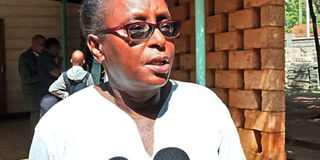Fida, other gender groups condemn FGM crusader

Dr Tatu Kamau, who has filed a case in Machakos seeking to have female circumcision legalised, speaks to reporters outside the Machakos High Court on January 17, 2018. PHOTO | STEPHEN MUTHINI | NATION MEDIA GROUP
What you need to know:
Tatu Kamau, the doctor behind the case, also wants the Anti-FGM Board abolished.
Dr Kamau added that if the cut was legalised, women could have it done in hospital.
Tatu Kamau, the doctor behind the case, also wants the Anti-FGM Board abolished.
Gender lobbies have condemned a doctor who has gone to court seeking the legalisation of female genital mutilation.
Federation of Women Lawyers chairperson Josephine Mong’are yesterday said the idea was retrogressive.
“It is a bad. Even the Constitution outlaws retrogressive cultures. As a doctor, she should inform us the positive side of FGM,” said Ms Mong’are.
Fida is enjoined in the case that has attracted attention. Tatu Kamau, the doctor behind the case, also wants the Anti-FGM Board abolished.
She said the practice was part of African culture and criminalising it was wrong.
Dr Kamau added that if the cut was legalised, women could have it done in hospital.
LAGGED BEHIND
Former Anti-FGM Board chairperson Jebii Kilimo said legalising the cut would take the country back by many decades.
According to her, communities that insisted on the practice lagged behind others in education and general development.
She said the only reason Dr Kamau gave for legalising FGM was the cultural aspect “which is not convincing”.
“That case is misplaced. She is not talking about challenges that women who have undergone the cut go through. The law against FGM was drafted and passed to protect people from cultures that were harmful,” Dr Kilimo told the Nation.
She added that Dr Kamau was going against the Hippocratic Oath by suggesting the cut could be performed by medics.
NO HARM
“Medical practitioners have sworn to do no harm to their patients,” Dr Kilimo said.
In a recent TV interview after filing the case, Dr Kamau said if a woman could decide to take alcohol, smoke cigarettes or join the military, “which are all harmful”, then she could also take the decision to have the cut.
Dr Florence Wachira, the acting chairperson of the National Gender and Equality Commission, said Dr Kamau’s reasoning on culture was flawed.
“Those who undergo FGM are usually young and cannot make decisions,” she said, adding that people advocating for the cut should not just look at one aspect of tradition but the whole reasoning behind it.
Dr Wachira said the country had other urgent issues to deal with and that legalising the cut was not a priority.
“Regions where FGM is widely practised do not have enough hospitals in the first place. We are not talking of Nairobi, Kiambu or Nyeri counties,” she said.




